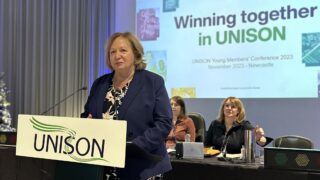The government must increase statutory maternity pay to £364.70 a week so new mothers are not forced back to work too early, say UNISON and Maternity Action today (Friday).
Both organisations are concerned some women are cutting short their maternity leave, skipping meals and making other drastic choices because they cannot afford to live on the current statutory weekly amount of £172.48*.
UNISON and Maternity Action are urging ministers to more than double the payment at the very least so women receive the equivalent of the national minimum wage of £10.42 an hour.
A recent survey by Maternity Action on behalf of UNISON shows a quarter of women on maternity leave say they have gone without eating – sometimes all day – so they can afford to feed their families.
Eating their children’s leftovers, brushing their own teeth to suppress hunger pangs, surviving on toast some days, and relying on friends and family for food parcels are among the desperate measures to which new mothers are resorting, according to the survey.
The findings, released to coincide with UNISON’s annual women’s conference in Brighton this week, also show financial pressures are forcing new mothers to return to work sooner than they intended.
The survey**, based on the responses of 1,400 mothers in the UK who had taken maternity leave, shows nearly half (49%) of the women said they were buying less-healthy food to save money. More than a third (35%) were skipping meals or having smaller portions.
One in twenty (5%) said they had occasionally not eaten all day to reduce spending on food as they were so concerned about rising living costs.
UNISON and Maternity Action say the findings show the health consequences of not eating properly. For example, one woman said she was prescribed medication after becoming anaemic through skipping meals.
Results from the survey show more than seven in ten (71%) women said they worried ‘a lot’ about money during their pregnancy or maternity leave.
Financial pressures forced more than half (58%) of new mothers to return to work before they were ready. Some had cut their leave to as little as six months because of money worries.
To save money, women responding to the survey said they had reduced the hours their heating was on – 70% had turned down their thermostat and 55% the heating in some rooms.
Women said this led to problems with damp, mould and resulting health problems such as respiratory issues. They also worried about keeping their new babies warm enough.
UNISON general secretary Christina McAnea said: “Everyone is feeling the impact of escalating living costs. But it’s hitting new mums particularly hard.
“No mother should have to go without food or skip meals. But the failure of maternity pay to keep up with increasing living costs is driving many pregnant workers and new mothers into severe financial hardship.
“The government is effectively forcing many women to choose between work and family. They must raise maternity leave pay to ensure no one is penalised for having a baby.”
Maternity Action director Ros Bragg said: “Mothers shouldn’t be forced to cut short their maternity leave because they can’t make ends meet. This is an important time for women to recover from the birth and bond with their baby.
“Women should be reducing their stress levels during pregnancy and their child’s first year, not worrying about how to pay for essentials. Stress during pregnancy puts women at increased risk of post-natal depression and other mental health conditions.
“The government should be supporting pregnant women and new mothers to live healthy lives, not leaving them struggling to keep their house warm and eat a balanced diet.”
Notes to editors: – *Women are currently entitled to six weeks of statutory maternity pay at 90% of their full pay after giving birth. This then drops to £172.48 a week for 33 weeks or to 90% of their average weekly earnings – whichever is lower.– **The online survey was carried out in December 2022 and January 2023 by Maternity Action of 1,394 mothers who had taken maternity leave at some point between January 2021 and December 2022.– UNISON’s annual women’s conference began yesterday (Thursday 15) and continues until tomorrow (Saturday 17 February) in Brighton. Motions being debated over the three days include flexible working, childcare, the cost of living, rights for pregnant women, violence against women and the impact of the menopause in the workplace. Christina McAnea is giving a speech to delegates on Friday morning.Case studies:– Caroline went back to work when her son was only three months old. She said: “We had to take a £5,000 loan to keep us afloat for those three months (on maternity leave) because the maternity pay wasn’t enough.”– Louise said: “I returned to work earlier than I’d have liked as I’m the main earner in our house and we could not afford to live on statutory maternity pay.”– UNISON is the UK’s largest union with more than 1.3 million members providing public services in education, local government, the NHS, police service and energy. They are employed in the public, voluntary and private sectors.
Media contacts: UNISON Liz Chinchen M: 07778 158175 E: press@unison.co.uk Maternity Action Ros Bragg M: 07913 381208 E: rosbragg@maternityaction.org.uk

